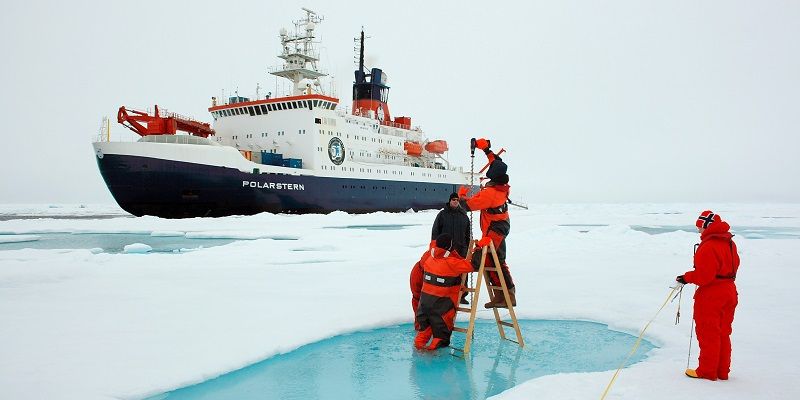
A research ship carrying 80 international scientists, including researchers from the University of Leeds, is studying the region’s climate system.
The ship will be deliberately wedged into Arctic sea ice as it floats past the North Pole.
The expedition aims to further understanding of the Arctic climate system and how it affects global climate models.
This year-long study aboard the 120-metre long RV Polarstern will see the research vessel move with the current in the ice across the central Arctic Ocean from September 2019 to September 2020.
Exploring the Arctic climate system
Spearheaded by Germany’s Alfred Wegener Institute, the €120 million Multidisciplinary drifting Observatory for the Study of Arctic Climate (MOSAiC) mission aims to answer some of the biggest scientific questions about the Arctic, including investigating why the region is warming twice as fast as the global average.
The Natural Environment Research Council (NERC) has now awarded grants worth £1.8 million to six research proposals, including one led by Professor Ian Brooks from the School of Earth and Environment, that will utilise a two-month berth on the German research vessel.
“Current knowledge of these physical processes is relatively poor, largely because of a lack of extensive in situ measurements, and in particular measurements taken throughout the winter. MOSAiC is offering a unique opportunity to overcome these barriers.”
A unique environment
The Leeds project will focus on atmospheric boundary-layer dynamics, particularly the vertical profile of mean wind and turbulent mixing.
These are the primary factors that control the interactions between the Arctic region’s atmosphere and surface. These factors regulate the exchange of heat, water vapour, and trace gases – including greenhouse gases such as carbon dioxide and methane. They also influence and are influenced by cloud properties and processes.
Professor Brooks said: “The Arctic is a unique environment and many of the physical processes that control the climate there are either specific to Polar Regions, such as sea ice formation and melt, or have key differences from the lower latitude regions.
“Current knowledge of these physical processes is relatively poor, largely because of a lack of extensive in situ measurements, and in particular measurements taken throughout the winter. MOSAiC is offering a unique opportunity to overcome these barriers.
“Our research will focus on the interactions between the boundary-layer structure and the surface turbulent fluxes of momentum and heat over a full annual cycle.
"By using active remote sensing measurements we will be able to gather a wide range of data, such as wind and turbulent structure from the surface up to a few hundred meters into the atmosphere.
“Our measurements will not only give us new insight into how the atmospheric boundary-layer functions but we will also be providing context for many other ongoing and future measurements.”
International collaboration
Dr Ryan Neely, also from the School of Earth and Environment, and Dr Barbara Brooks from the National Centre for Atmospheric Science are co-investigators for the project, which will include collaboration from the University of Trier, Germany and the University of Colorado.
“Science has no borders and I am delighted that six teams of our world leading scientists, backed by our modern Industrial Strategy, have been chosen to join this international expedition. ”
The voyage will see UK researchers working alongside nearly 600 international scientists and crew from 17 countries as part of this major international effort to better understand the fastest changing environment on the planet.
Global climate impact
Minister of State for Universities, Science, Research and Innovation, Sam Gyimah, said: “Science has no borders and I am delighted that six teams of our world leading scientists, backed by our modern Industrial Strategy, have been chosen to join this international expedition. This government is determined to tackle the devastating effects of climate change."
NERC Associate Director of Research Ned Garnett said: “We know that the dramatic changes in the Arctic climate system and the rapid decline in the extent of Arctic sea ice in summer has a major impact on our global climate.
"However, we don’t yet adequately understand this warming process, and a lack of year-round observations in the central Arctic makes predicting future changes in the area very challenging. This gap in our understanding of the Arctic climate is one of the most pressing problems in predicting global climate change.”
He said, as part of the MOSAiC programme, world-class scientists from the UK will join international counterparts on the Polarstern to help scientists to better predict changes in the Arctic and globally.
Further information
Image credit: Alfred Wegener Institute
The MOSAiC project has been designed under the umbrella of the International Arctic Science Committee (IASC), led by the AWI, Russian Arctic & Antarctic Research Institute (AARI) and the University of Colorado (CIRES).
The budget for the expedition has been contributed by all of the international partners involved, but chiefly by the Helmholtz Association, which means 90 per cent came from Germany’s Federal Ministry of Education and Research (BMBF).
For any additional information email press officer Anna Harrison at a.harrison@leeds.ac.uk